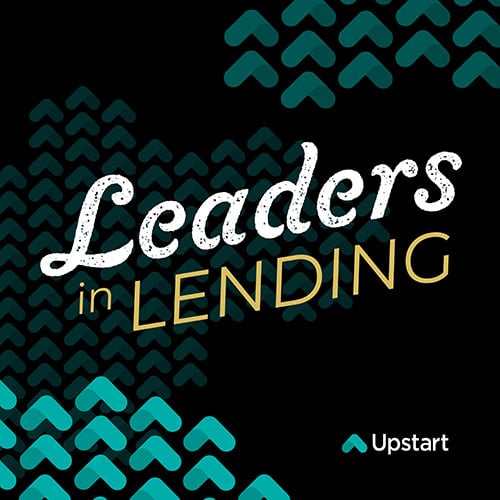Leaders in Lending | Ep. 119
Partnering with a Fintech to Diversify in Challenging Times
Julie Thurlow, President & CEO at Reading Cooperative Bank, and Phil Bryan, Chief Banking Officer at Reading Cooperative Bank, join us for a tell-all webinar where they discuss their partnership with Upstart.



GUEST SPEAKER
Julie Thurlow
Julieann M. Thurlow is responsible for the bank's strategic direction and management. She also serves as President of the RCB Charitable Foundation. Julieann is the Vice Chair of the American Bankers Association (ABA). She was Past Chair of the ABA's Core Platforms Council. Julieann currently serves as a member of the Government Relations Administrative Committee and Membership Council. She is a founding of member of Alloy Labs, a consortium of banks nationally formed to innovate in the banking space and is a Director of Atlantic Community Bankers Bank (ACBB). Locally, Julieann serves on the MA Fintech Workgroup and is a Board Member of the Lawrence Partnership, the Massachusetts Taxpayer Foundation, and the Lawrence Community Health Center. In 2022, Julieann was appointed to the Massachusetts Development Finance Agency by Governor Charlie Baker. She is past Chair of the Cooperative Central Bank and was a member of the Federal Reserve’s CDIAC Council. American Banker Magazine has repeatedly named Julieann to its list of the Top 25 Women to Watch in Banking. The Commonwealth Institute has named Reading Cooperative Bank a Top 100 Women-Led Business for the past seven years running. In addition to an MBA from the Charles F. Dolan School of Business at Fairfield University, Julieann has completed advanced studies at the Stonier Graduate School of Banking, the Massachusetts School for Financial Studies, Harvard Business School’s Division of Continuing Education, and the CEO Leadership Lab at Wharton’s Aresty Institute for Executive Education.

GUEST SPEAKER
Phil Bryan
Phil Bryan is Executive Vice President and Chief Banking Officer. Prior to joining RCB, he spent five years as the President/CEO of The Cooperative Bank and was the EVP/Chief Operating Officer at Georgetown Bank. Over the course of his extensive lending career, Phil served as SVP of Retail & Lending at Metro Credit Union, SVP & Small Business State Manager at TD Bank, VP, Retail Banking at MetroWest Bank, and VP, Business Development Officer at Citizens Bank. Phil has a BS in Human Resource Management from Southeastern Massachusetts University. In addition, he is certified in Talent Optimization from the Predictive Index. Phil currently serves on the Executive Board of the Cole Strange Foundation and is a past member of The Central Parkway YMCA’s Board of Advisors. In the past, Phil has served on the American Bankers Association’s Mutual Institutions Council and the Asian Center for Merrimack Valley’s Board of Directors as Treasurer. Phil lives in Dedham, MA with his wife, Wendy, and three sons.

ABOUT
Reading Cooperative Bank
RCB is a cooperative bank and proud of it. Here, our customers own the bank — it’s how we’ve been since 1886 and it's how we’re staying. Call 781-942-5000, visit readingcoop.com, or stop by a branch in Andover, Burlington, Lynn, Nahant, North Reading, Reading or Wilmington to see what "banking for all" is all about.
Key Topics Discussed
-
Tech, automation and AI: streamlining processes and tailoring products
- Building a successful, transparent fintech partnership
- Ensuring compliance in a tech-backed environment

“Something that stood out versus competitors is Upstart’s evolving credit model that determines if someone has attributes to pay a personal loan on a timely basis.” - Julie Thurlow

“Upstart did a lot of the leg work with regulatory bodies and going over their model.” - Phil Bryan

“It’s a tough market to hire people, so when you find an end-to-end solution without needing to hire staff, it makes growing a portfolio much easier to manage.” - Phil Bryan
EPISODE RECAP & SUMMARY
Providing fair access to credit in consumer lending is at the forefront of all financial institutions today — and tech is here to make that possible.
Through fintech partnerships, AI and automation, institutions are able to streamline a vast majority of their processes for analyzing risk factors, assessing delinquency data and more. Even more, institutions are able to rapidly tailor their products to meet their customers’ needs. With the extraordinary amount of innovation recently in the financial universe, ensuring accurate reporting, regulatory compliance and transparent, trustworthy fintech partnerships can be tricky.
Julie Thurlow, President & CEO at Reading Cooperative Bank, and Phil Bryan, Chief Banking Officer at Reading Cooperative Bank, join us for a tell-all webinar where they cover these topics and more.
Join us as we discuss:
- Tech, automation and AI: streamlining processes and tailoring products
- Building a successful, transparent fintech partnership
- Ensuring compliance in a tech-backed environment
Tech, automation and AI: streamlining processes and tailoring products
Community banks have lost the personal loan business alongside the auto loan business and are quickly losing the mortgage business in light of increased automation at every turn, paired with countless options for credit.
“Regulators are very concerned about equitable access to credit and financing,” Thurlow says. “However, the consumer loan is probably the most expensive to originate, as it relates to the return you achieve.”
Unless it's automated, a short-term or small-dollar loan will cost more than a bank would make in interest, but it is what consumers need. People recognize the need for credit to take the next steps and achieve their financial goals.
The question comes down to: “How do we get money into people’s hands in a profitable way?” The answer? Processes must be automated and borrower accessibility needs rapid expansion.
“Consumers have changed their behaviors for an expectation of immediate satisfaction,” Thurlow says. “Being able to get anything on your mobile device and to act when you need to and get access to the things that you need — that's important to consumers.”
Building a successful, transparent fintech partnership
Many community banks and FinTech partnerships grow from fortuitous conversations and branch out from there, as is the nature of new-age software and traditional systems. Organic connection and genuine need drive innovation.
“We are looking for FinTechs that provide a service our customers are looking for, and not some obscure unrelatable service — it has to be within the banking bandwidth. And, for us, it has to align with our organizational values,” Thurlow says.
Reading Cooperative Bank looks for transparent, fair, sustainable FinTechs that match their bandwidth and align with company objectives and timelines.
“We also look for support from the FinTech itself. It's foreign to us, we need a lot of hand-holding in the process to say, ‘Okay, here's some other people to talk to that have gone through it. Here's what other institutions are doing now,’” Bryan shares.
Partnering with a FinTech that understands iteration and continued growth is paramount for a sustainable relationship, especially when embarking down the FinTech path for the first time as a traditional community bank.
With that comes careful reports and monitoring of the outcomes on an ongoing basis to avoid any surprises for the relevant institutions. This practice helps ensure that new offerings continue as an additive feature for consumers and do not take adverse risks.
“The challenge from an innovation perspective is a FinTech wants to make the first bank partnership, but the bank needs to make sure the FinTech has the glide path in front of them, that it’s going to be there in the future,” Thurlow says. “Because once this product is offered, and there's an expectation from our consumers that it'll be available to them, we can't just pull it from the menu.”
Implementing a robust vendor review process helps to identify between the sustainable and the less-sustainable options in FinTech.
Ensuring compliance in a tech-backed environment
Due diligence is a chief concern in this tech-backed environment. Partnering with an ill-equipped FinTech could cost a bank's reputation alongside monetary loss.
“There's a lot of vendor due diligence, finding out who the other institutions are that are writing, looking at the behaviors that are actually happening,” Thurlow says.
The work doesn’t stop once compliance is assured. From there, a project manager can be a great support for keeping initiatives on track.
“We have to meet regularly in the beginning, on a weekly basis, to make sure we're hitting all our road stops,” Bryan says. “Getting the board involved, having those reports to the board as we started to launch, presenting the KPIs we're looking to attain, and then keeping them informed every quarter.”
Finding transparent, compliant FinTech partnerships may be tricky to navigate, but the payoff of increased accessibility and meeting consumer expectations make up for the risks.
“Is it a good time to partner with a FinTech? Definitely,” Bryan says. “Particularly if you can streamline the process, make it very efficient, and not have to deal with ongoing issues with staff and employees, building a department that may walk out on you.”
Stay tuned for new episodes every week on the Leaders in Lending Podcast.





